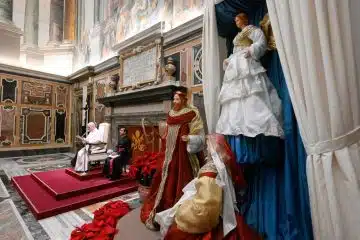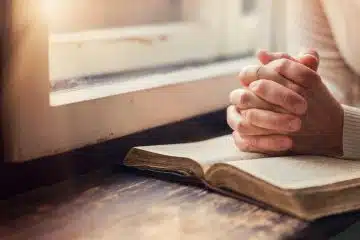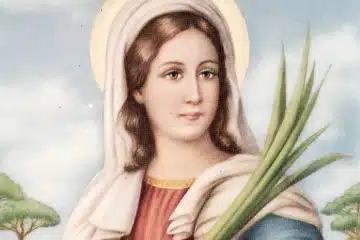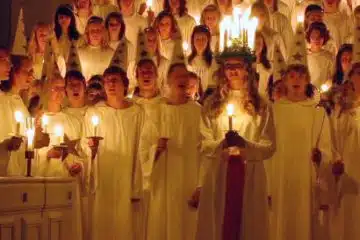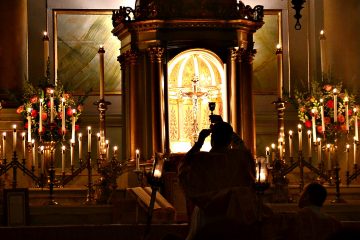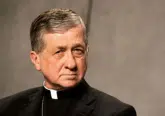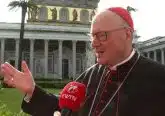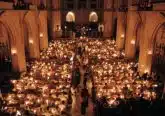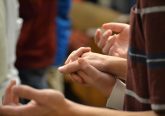Bishop Paprocki: We must weigh cost of ‘extraordinary’ shutdowns
By Carl Bunderson
Denver Newsroom, Sep 24, 2020 / 02:01 pm MT (CNA).- In an essay published this month, Bishop Thomas Paprocki of Springfield in Illinois argued that months-long lockdowns in response to the coronavirus are an extraordinary means of saving life, and are therefore not morally obligatory and should not be coerced by the state.
We have “taken the extraordinary and unprecedented step of shutting down a major portion of our economy for the past several months, telling people to stay home, not to go to work, and not to go to school,” Bishop Paprocki wrote in “Social Shutdowns as an Extraordinary Means of Saving Human Lives”, an essay in the September edition of Ethics & Medics, a commentary published by the National Catholic Bioethics Center.
“The distinction between ordinary and extraordinary means of preserving life is important, for if a means is extraordinary—that is, if the burdens outweigh the benefits—then it is not morally obligatory and should not be coerced by state power,” he wrote.
“[I]n the face of a pandemic, do we have a moral obligation to shut down our society, require people to stay at home, put employees out of work, send businesses into bankruptcy, impair the food supply chain, and prevent worshippers from going to church? I would say no,” the bishop concluded, saying that such actions “would be imposing unduly burdensome and extraordinary means.”
Speaking to CNA, Bishop Paprocki drew an analogy with the distinction between ordinary means of preserving the life of a patient in medical care, which are obligatory, and extraordinary means, which are so burdensome that they are not obligatory, in the response to a pandemic.
“It just occurred to me that that very word extraordinary is a word that we use in Catholic medical ethics when we talk about treatments to save life, when you’re talking about an individual patient,” he said.
“Looking back, at emails and decisions we were making at that time, we were very much thinking in the middle of March, that this was going to be for a couple of weeks – we’ll close our schools until the end of March, and then things will reopen.”
“Obviously that didn’t happen that way,” he said, “so the lockdowns got extended another month, and so here we are several months later and this is ongoing.”
“The impact that it’s been having on people being able to go to church, receive Communion, go to their jobs, go to school, with all that being basically shut down for a period of time, again, it just struck me as extraordinary, that this had never happened in my lifetime, and probably in the lifetime of most people who are alive today, and so the word extraordinary kept coming back to me,” he explained.
This distinction between ordinary and extraordinary means was first made by Venerable Pius XII in a 1957 address to medical workers, during which he said that “Normally one is held to use only ordinary means … that is to say, means that do not involve any grave burden for oneself or another. A stricter obligation would be too burdensome for most men and would render the attainment of the higher, more important good too difficult. Life, health, all temporal activities are in fact subordinated to spiritual ends.”
Bishop Paprocki asked, “What are the spiritual ends? The spiritual end is eternal life, and so everything else is subordinated to that.”
“Let’s take one issue, in terms of being able to go to church and receive the sacraments, Holy Communion; or a person who’s dying to receive Anointing of the Sick. All of that is more important than our temporal activities, or even our physical life here on earth. So I thought, ‘well, if that applies to … individual people, why can’t that same principle apply to society as a whole? Do we have to do everything possible to save every human life? Well not if it’s extraordinary.”
He noted that more than 35,000 people die annually in the US in auto accidents.
“How do we save those every year? Let’s not drive. Let’s close down our highways, don’t get in your car,” Bishop Paprocki said.
“We wouldn’t do that, because people need to get to work, to school, and other obligations. So what do we do? We don’t throw caution to the wind. We take precautions, like seat belts and air bags, and you follow the rules of the road; and if you do that, there’s much greater likelihood you won’t die in an auto accident, but that’s not an absolute guarantee. There are no absolute guarantees in life.”
If this principle of the distinction between extraordinary and ordinary means “applies to individuals, why doesn’t it apply to our society as well?” he asked. “And I would argue that it should.”
“When you’ve got politicians, for example governors and other government leaders, making decisions about shutting things down, I’m not questioning their motivation – it’s a good motivation, they’re trying to save life, and that’s a good thing – but I’m trying to add a little bit more of a moral analysis to that conversation.”
“It’s not that simple to say we have to do everything to save every life possible, because we just don’t do that, that’s not possible. Instead we take ordinary means, and that’s what I’m hoping to contribute to the conversation here.”
The bishop said he is “anticipating that this whole question will come up again,” and he noted that Israel has begun a second lockdown because of coronavirus, which will last three weeks. The country was also locked down from late March to early May.
“In the US if we have another wave of Covid, or even a very severe flu, are we going to lock everything down again?” Bishop Paprocki asked.
“I would be arguing that morally, we don’t have to. If someone voluntarily says, ‘you know what, it’s not safe out there, I’m not going out’, fine, that’s your decision; but in terms of the government ordering everything to be shut down, I just don’t think that’s morally required.”
The bishop said he has heard anecdotally that numerous people “are thinking along these lines, but they don’t know exactly how to articulate it … people are making this analysis in their own minds that there are a lot of different factors that we have to weigh here, and so what I’m trying to do here is add some vocabulary from our Catholic moral tradition that perhaps could help this conversation.”
In his essay, he cited a July broadcast of NBC Nightly News in which five pediatricians “unanimously and emphatically agreed that the benefits of children’s being back at school outweigh the risks.”
Parents, teachers, and students, he said, have told him they’re “very happy to be back in school”; Catholic schools in the diocese, and across Illinois, have reopened. “I’m hearing from people saying it’s more important, even if there is some risk … we’re weighing the burdens and the benefits here. There is some risk there for the spread of Covid. On the other hand, what’s the risk to children if we shut down their education?”
“When I’m saying that shutdowns are extraordinary means, I’m certainly not disregarding the importance of doing what we can to save life, to help people who are sick, to try and deal with the threat of Covid,” Bishop Paprocki emphasized.
“My background in healthcare says to me that these are complicated decisions, but we also have very nuanced ways of trying to look at them and trying to analyse them.”
The bishop comes from a family of pharmacists, with four generations in the business; he is also vice-president of the Illinois Catholic Health Association, and while a priest of the Archdiocese of Chicago he served as Liaison for Health and Hospital Affairs.
He also addressed the balance of concerns for the elderly, vulnerable as they are to the coronavirus.
“We’re taking steps to make sure the elderly don’t get sick, and don’t contract Covid, and that’s a very important factor, because they’re a higher risk group, and more vulnerable than young people; on the other hand, their physical well being, as important as it is, is not the only concern.”
The bishop had related in his essay that his aunt, Marian Jacobs, had her 102nd birthday in March. She would normally celebrate with her family, but was barred from doing so. “Indeed with very limited family visits since March, she has declined rapidly and has been moved from her apartment to assisted living,” he wrote.
“The elderly, they need to be with people, with family, they need social interactions, as much as anybody does,” he told CNA. “And so there we have to try to strike a balance between keeping them physically safe, and at the same time allowing them to be happy. As I wrote in my article, I’m more afraid that my aunt’s going to die of a broken heart than she will of Covid.”
Discerning the difference between ordinary and extraordinary means is a “judgement call,” the bishop explained.
“There are no easy benchmarks,” Bishop Paprocki conceded. “If you compare this by analogy to end of life decisions, when a family is talking to a doctor about what to do for a dying person, what kind of treatment, whether to put them on hospice, or palliative care, is there some way to ease their suffering? Those are difficult conversations to have, but they’re important conversations. So I’m not downplaying how difficult that is for our government leaders to make these decisions.”
One important criterion, he affirmed, is the duration of a lockdown.
While temporary measures can be good, even essential, “can we shut down our sacraments indefinitely? I don’t think so,” he said.
“We could do it for a short period of time, [but if] we can’t tell you when you’re going to be able to receive the sacraments again, then I think that’s subordinating our spiritual ends, as Pope Pius XII talked about, to the physical ends.”
“For those of us who do see eternal life as more important than our physical life on earth, the government shouldn’t be interfering with our efforts to practice our faith,” he said, noting that the widespread fear of death remains a call for the church to evangelize.
“Death is part of the natural lifecycle, but if you don’t believe in God, in an afterlife, the only thing you believe in is the physical world here and now, well, death becomes much more ominous,” he said.
“Our culture just has a hard time dealing with it. We don’t like to talk about death, we use euphemisms; instead of saying someone died, we say someone passed.”
“We don’t even like to talk about funerals,” he continued. “It’s a ‘celebration of life’ and that’s fine – there’s nothing wrong with celebrating a person’s life, but that’s looking back, remembering that person’s life here on earth. But our Catholic funerals look ahead, we pray for the repose of the soul, we’re praying for their eternal life.”
“That’s the good news of the Gospel, that Jesus has come to offer us eternal life in his kingdom, so that’s where we should put our focus.”



